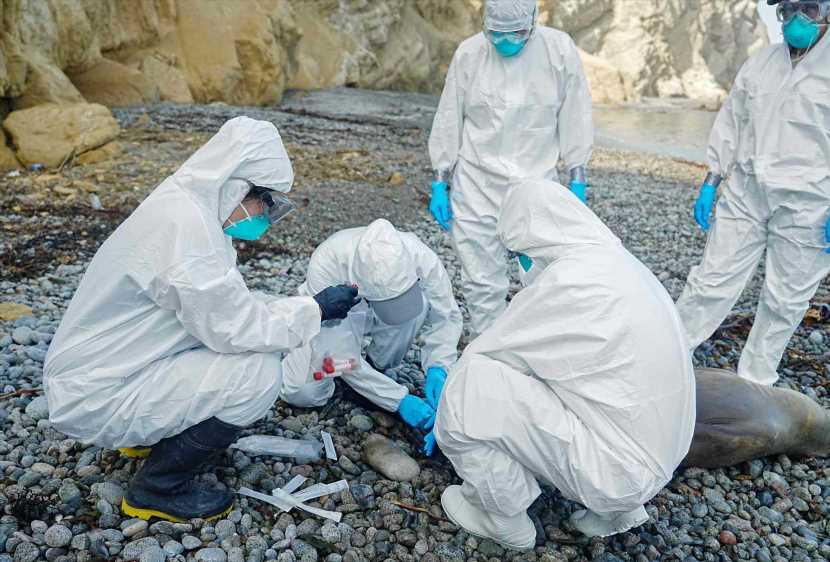BIRD flu has killed two dolphins for the first time in the UK.
The animals were discovered last month in Devon and Pembrokeshire amid growing fears after the virus jumped to mammals.
A highly contagious strain of avian influenza H5N1, commonly known as bird flu, was confirmed in the mammals by the Animal and Plant Health Agency.
The virus has wiped out millions of birds worldwide over the last two years, but it also affects other animals.
Although it is the first time dolphins have been killed by the infection in British waters, 23 other mammals have been affected.
It has spread to seals, otters, harbour porpoises and foxes – raising fears in recent months due to the "unprecedented" current outbreak since October last year.
Read More
Bird flu warning as fears of human pandemic grow after jump to mammals
Bird flu spilling over to humans ‘not farfetched’ as experts call for new vaccines
The H5N1 strain already has a fatality rate of around 50 per cent among people – 870 people have been infected with bird flu in the past 20 years and 457 of these died.
A spokesperson for the Animal and Plant Health Agency said: "Samples taken as part of routine wildlife surveillance have detected the presence of influenza of avian origin in two dolphins and one porpoise.
"The animals were found dead, and it is very likely they had predated on infected wild birds.
"The presence of influenza of avian origin in mammals is not new, although it is uncommon, and the risk of the H5N1 strain to non-avian UK wildlife remains low."
Most read in Health
Is your boss making you sick? The 'toxic' personality traits of bad leaders
The surprising way that having a cat or dog is affecting your health
Striking doctors hope to meet with Health secretary TODAY for pay deal
Gonorrhoea warning as cases surge by 21% – the six signs to look out for
Elsewhere in the globe, bird flu has previously affected sea lions and mink as well as the winged animals.
This comes as scientists have warned the virus may be mutating to infect human cells after an 11-year-old girl died after contracting the stain.
The young girl in Cambodia is believed to have been infected by poultry in Prey Veng province, close to Vietnam.
She is the first person to die from the bug in 2023.
Her 49-year-old father – one of 12 close contacts tested – had also been infected.
Dr Erik Karlsson, who led the team at the Pasteur Institute of Cambodia that investigated the girl's virus, said it differed from samples taken from birds in the area.
"There are some indications that this virus has gone through a human," he revealed in an interview with Sky News.
"Any time these viruses get into a new host they'll have certain changes that allow them to replicate a little bit better or potentially bind to the cells in our respiratory tract a little bit better," he explained.
Read More on The Sun
I’m a mum-of-one – Universal Credit change in Budget is ‘game-changer’ for me
I’m live in a shed in my parents’ garden – I love my life & don’t pay rent
Scientists have called on the Government to create a vaccine for the flu before it can become more harmful to humans.
“If there was an outbreak in Europe, the Middle East, America or Mexico tomorrow of H5N1 in humans, we wouldn't be able to vaccinate the world within 2023,” said Sir Jeremy Farrar, chief scientist of the Word Health Organization at a press briefing in London.
How can you avoid catching bird flu?
UKHSA has said that bird flu “is primarily a disease of birds and the risk to the general public’s health is very low”.
f you find dead wild waterfowl (swans, geese or ducks) or other dead wild birds, such as gulls or birds of prey, you should report them to the Defra helpline (03459 33 55 77 – select option 7).
All bird keepers, even those of pets, must keep a close watch on them for signs of disease, and it is a legal requirement to register poultry, such as chickens or pheasants.
If you visit a country that has had an outbreak of bird flu, you should:
- wash your hands often with warm water and soap, especially before and after handling food, in particular raw poultry
- use different utensils for cooked and raw meat
- make sure meat is cooked until steaming hot
- avoid contact with live birds and poultry
The NHS also says to avoid visiting markets where live animals are sold in countries that have had bird flu outbreaks
What are the symptoms of bird flu in humans?
The main symptoms of bird flu can appear very quickly and include:
- a very high temperature or feeling hot or shivery
- aching muscles
- headache
- a cough or shortness of breath
Other early symptoms may include:
- diarrhoea
- sickness
- stomach pain
- chest pain
- bleeding from the nose and gums
- conjunctivitis
Source: The NHS
Source: Read Full Article













